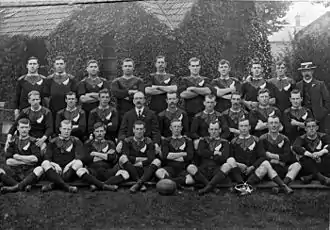Fred Newton (rugby union)
Fred Newton (7 May 1881 – 10 December 1955)[1][2] was a New Zealand rugby union player who represented the All Blacks between 1905 and 1906. His positions of choice were lock and loose forward.
| Birth name | Frederick Newton | ||||||||||||||||||||||||||||||||||||||||||||
|---|---|---|---|---|---|---|---|---|---|---|---|---|---|---|---|---|---|---|---|---|---|---|---|---|---|---|---|---|---|---|---|---|---|---|---|---|---|---|---|---|---|---|---|---|---|
| Date of birth | 7 May 1881 | ||||||||||||||||||||||||||||||||||||||||||||
| Place of birth | Christchurch, New Zealand | ||||||||||||||||||||||||||||||||||||||||||||
| Date of death | 10 December 1955 (aged 74) | ||||||||||||||||||||||||||||||||||||||||||||
| Place of death | Christchurch, New Zealand | ||||||||||||||||||||||||||||||||||||||||||||
| Height | 1.82 m (6 ft 0 in) | ||||||||||||||||||||||||||||||||||||||||||||
| Weight | 95 kg (209 lb) | ||||||||||||||||||||||||||||||||||||||||||||
| Occupation(s) | Railway worker | ||||||||||||||||||||||||||||||||||||||||||||
| Rugby union career | |||||||||||||||||||||||||||||||||||||||||||||
| |||||||||||||||||||||||||||||||||||||||||||||
He was born in Christchurch in 1881 and he died in Christchurch in 1955. His ashes were placed at Lancaster Park.[3]
Career
Newton had an unusual playing career.
Out of the Linwood club in Christchurch, he played just one game for the Canterbury provincial side in 1901. He did not play again until 1904 where he totalled a further 6 matches.[4]

Newton was selected for the famous Original's tour of the Northern hemisphere. Before leaving Newton played in the three matches on the tour to Australia.[4][5]
He was the heaviest player in the squad[6] and because of that he was given the nickname, "Fatty".[3][4][7]
An injury prevented Newton from appearing in the first eight matches, but he recovered to play in 16 games.[4]
Although Bill Cunningham was preferred over Newton, Cunningham suffered injuries and then became sick preventing him from playing, thus Newton was selected in the team that played in the tests against England and Wales. Cunningham had recovered for the test against France but fortunately Newton was kept with Cunningham played as a loose forward.[3][4][6]
Newton scored a try in the test against England.[3][4][8][9]
After the tour Newton moved to Westport[10] for his job working with the railways.[3] He joined the White Star club in Westport. Ineligible for Canterbury, he played one final match for the Buller union, against Marlborough in 1908.[4][7]
It was reported that Newton had no desire to train hard in order to keep fit otherwise he certainly would've played more 1st-class games.[10]
Family
Newton was the grandfather of former All Black Ian MacRae's wife.[11]
References
- "the 1,109 New Zealand ALL BLACKS from 1884 - NATHAN to YOUNG :: FamilyTreeCircles.com Genealogy". www.familytreecircles.com. Retrieved 3 April 2016.
- "PECK of Taita - Family Tree". ngairedith.tribalpages.com. Retrieved 3 April 2016.
- "1905 All Blacks – the Canterbury connection". my.christchurchcitylibraries.com. Retrieved 3 April 2016.
- "Stats | allblacks.com". stats.allblacks.com. Retrieved 3 April 2016.
- Hare, McLintock, Alexander; Hutt., Arthur Cameron Swan, New Zealand Rugby Football Union official historian, Lower; Taonga, New Zealand Ministry for Culture and Heritage Te Manatu. "NEW ZEALAND TEAMS OVERSEAS". www.teara.govt.nz. Retrieved 3 April 2016.
- Chester, Rod; McMillan, Neville; Palenski, Ron (1987). The Encyclopedia of New Zealand Rugby. Auckland, New Zealand: Moa Publications. p. 126. ISBN 0-908570-16-3.
- "Other Buller Legends". Buller Rugby Football Union. Retrieved 3 April 2016.
- "1905 All Black 'ORIGINALS'". ALL BLACKS. Retrieved 3 April 2016.
- "Commemorating the 1905 Originals - Game 24 v England". All Blacks. Retrieved 3 April 2016.
- "Football". New Zealand Herald. 4 May 1907. p. 8. Retrieved 3 April 2016.
- "Former All Blacks star Ian MacRae is star guest at Cheltenham Rugby Club". Gloucestershire Echo. Retrieved 3 April 2016.
